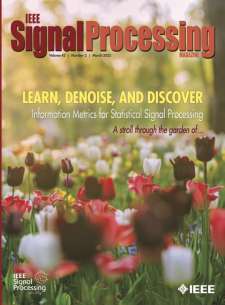SPS Members, You Are All Heirs of Fourier!
Top Reasons to Join SPS Today!
1. IEEE Signal Processing Magazine
2. Signal Processing Digital Library*
3. Inside Signal Processing Newsletter
4. SPS Resource Center
5. Career advancement & recognition
6. Discounts on conferences and publications
7. Professional networking
8. Communities for students, young professionals, and women
9. Volunteer opportunities
10. Coming soon! PDH/CEU credits
Click here to learn more.
SPS Members, You Are All Heirs of Fourier!
My three years of service as the editor-in-chief (EIC) of Signal Processing Magazine ( SPM ) are now coming to a close. During the past three years, many of us were deeply affected by serious political, social, and environmental events such as the war in Ukraine; protests for freedom in Iran; coups d’état in Africa; the COVID-19 pandemic; seisms in Turkey, Syria, and Morocco; huge floods in Libya and India; gigantic fires in North America and Southern Europe; and an avalanche of stones in the Alps, to name a few. In such a context, I believe that the IEEE slogan, “Advancing Technology for Humanity,” is incredibly relevant and timely. It also must be viewed in a wider sense, including the preservation of Earth and sustainable development. In point of fact, what would become of humanity without Earth? I believe that we must always have this in mind when contemplating our future projects, asking for funding, and while teaching.
The year 2023 also marks the 75th anniversary of the IEEE Signal Processing Society (SPS), and this too offers us an opportunity to think about the signal processing domain and ponder its roots and its dazzling evolution. It is also interesting to think about the early contributions that are of the highest importance in our domain and became its pillars. During ICASSP 2023 in Rhodes, Alan Oppenheim, Ron Schafer, and Tony Constantinides recounted the adventure of digital signal processing in the 1970s. Such ideas and the book Digital Signal Processing [1] were revolutionary at a time when computers were in their infancy. In fact, the concept of digital signal processing was met with mixed reviews and skepticism.
But long before this came the contributions of Jean-Baptiste Joseph Fourier who developed for our understanding the propagation of heat. His most famous book [2], published 201 years ago, in 1822, contains the basics of the Fourier series and transform and their ability to represent a large range of signals. Fourier’s ideas were also “out of the box,” and they were also received with reservations from eminent scientists who could not understand how and why a sum of continuous functions could approximate noncontinuous functions. Later, in 1829, Dirichlet presented the theoretical results concerning the convergence of Fourier series [A1]. Fourier’s life is a real novel, which the curious reader can discover in this well-documented and fun work (unfortunately, only in French) [3].
SPS Social Media
- IEEE SPS Facebook Page https://www.facebook.com/ieeeSPS
- IEEE SPS X Page https://x.com/IEEEsps
- IEEE SPS Instagram Page https://www.instagram.com/ieeesps/?hl=en
- IEEE SPS LinkedIn Page https://www.linkedin.com/company/ieeesps/
- IEEE SPS YouTube Channel https://www.youtube.com/ieeeSPS














